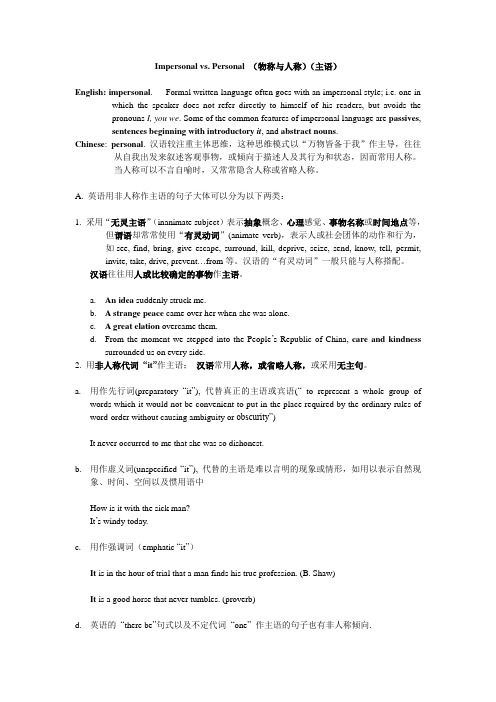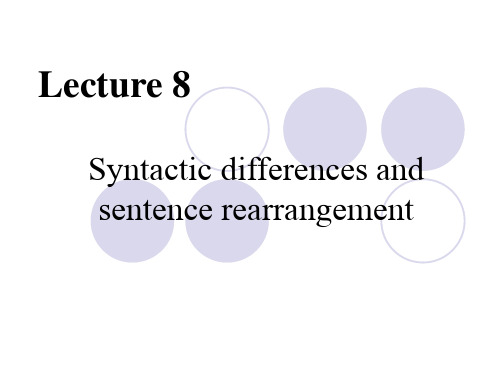汉英笔译基础教程 第6章 人称与物称
物称和人称

2 用作虚义词,代替的主语是难以言 表的现象或情形,用以表示自然现象 、时间、空间以及惯用语之中。 How is it with the sick man?
3 用作强调词,应到所需要的成分, 也是一种形式主语。 It is a good horse that never stumbles.
2. 转化非人称主语,把英语的简单句和复 杂句拆成汉语的并列句或流水句。
1) Her weariness and the increasing heat determined him to sit down in the first convening shade.他疲惫不堪,天气也越来越热,他决意一遇到个近 便的阴凉处,就坐下来休息。
信息中心位置,从而突显物称倾向。
汉语在无确定人称时,采用如有人,人们, 别人,大家等泛称或无主句,从而突显人称
倾向。
1)用作先行词代替真正的主语或宾语。 It never occurred to me that she was so dishonest. 我从来没想过她会这么不老实。
2)用作虚意词,代替的主语是难以言明的现象或者情形,如用以 表示自然现象、时间、空间以及惯用语中。 How is it with the sick man ? 那个病人怎么样了?
3. 把非人称代词主语句换成汉语的的无主句或主 语泛称句。
1) The mastery of a language requires painstaking efforts. 要掌握一门语言,必须下功夫。
2) A little flattery will fetch him. 稍一奉承就会把她迷惑住了。
4) A lack of information and formal educational training had left many persons without any generalized standards of judgment applicable to this novel situation.
物称和人称

英语用抽象名词而不用人称作主语的句子,如果运 用得当,可以获得很好的修辞和表达效果,读起来更 有英语感和“洋味”。这类句子结构严密紧凑,言简 意赅,许多句子从语法分析看属于简单句,但却表达 着复杂句或并列句的语义和逻辑关系。英译汉时常常 需要转换人称主语为人称主语或其他主语,此外,还 要采用多项如以下的其他技巧。
A current search of the files indicates that the letter is no longer in this Bureau’s possession. It is noted that the letter was received two months ago, and after study, returned to your office. In view of the foregoing, it is regretted that your office has no record of its receipt. If the letter is found, it would be appreciated if this Bureau was notified at once. 我们最近查找了卷宗,发现本局并无此信。可以肯定的是,我们于 两个月前收到此信,经研究后,已寄于贵处。鉴于以上情况,贵处 仍无此信的记录,我们深感遗憾。如果你们能找到此信,请即通知 本局,不胜感激。
英汉语言对比物称与人称

汉语人称倾向
02
相比之下,汉语更倾向于使用人称表达法,强调主观感受和情
感。
翻译策略
03
在翻译过程中,应根据原文的语境和语义,选择合适的物称或
人称表达法,以传达原文的准确意义。
翻译中的人称选择
第一人称
在描述特定事件或观点时,使用 第一人称代词(如“we”、 “us”、“I”、“me”)可以 增强文章的直接性和说服力。
WENKU DESIGN
WENKU DESIGN
2023-2026
ONE
KEEP VIEW
英汉语言对比物称与 人称
WENKU DESIGN
WENKU DESIGN
WENKU
REPORTING
https://
CATALOGUE
目 录
• 引言 • 英汉语言物称表达 • 英汉语言人称表达 • 物称与人称选择的影响因素 • 物称与人称选择在翻译中的应用 • 结论
语用功能
在英语中,物称表达方式可以用于委婉地表 达自己的观点和情感,避免直接提及对方。 而在汉语中,人称表达方式可以更加直接地 表达自己的观点和情感,强调对方的责任和 义务。
PART 05
物称与人称选择在翻译中 的应用
翻译中的物称选择
英语物称倾向
01
在英语中,物称表达法更常见,强调客观性,减少主观色彩。
人称转换
在汉译英时,如果汉语句子使用人称表达法,可以 将其转换为英语的物称表达法,以符合英语的表达 习惯。
语境考虑
在转换物称或人称时,需要考虑原文的语境 和语义,确保译文准确地传达了原文的意义 和语气。
PART 06
结论
研究成果总结
英语倾向于使用物称表达法,强调客观性,而汉 语则更倾向于使用人称表达法,强调主观性。
笔译人称与物称-

Impersonal vs. Personal (物称与人称)(主语)English: impersonal. Formal written language often goes with an impersonal style; i.e. one in which the speaker does not refer directly to himself of his readers, but avoids thepronouns I, you we. Some of the common features of impersonal language are passives,sentences beginning with introductory it, and abstract nouns.Chinese: personal. 汉语较注重主体思维,这种思维模式以“万物皆备于我”作主导,往往从自我出发来叙述客观事物,或倾向于描述人及其行为和状态,因而常用人称。
当人称可以不言自喻时,又常常隐含人称或省略人称。
A. 英语用非人称作主语的句子大体可以分为以下两类:1. 采用“无灵主语”(inanimate subject)表示抽象概念、心理感觉、事物名称或时间地点等,但谓语却常常使用“有灵动词”(animate verb),表示人或社会团体的动作和行为,如see, find, bring, give escape, surround, kill, deprive, seize, send, know, tell, permit, invite, take, drive, prevent…from等。
汉语的“有灵动词”一般只能与人称搭配。
汉语往往用人或比较确定的事物作主语。
a.An idea suddenly struck me.b. A strange peace came over her when she was alone.c. A great elation overcame them.d.From the moment we stepped into the People’s Republic of China, care and kindnesssurrounded us on every side.2. 用非人称代词“it”作主语;汉语常用人称,或省略人称,或采用无主句。
汉英笔译6-句层对比与句式选择

句中成分做主语——与谓语动词的逻辑搭配
他一直希望自己能成为老板的助手。 The idea that he should become an assistant to his boss has never deserted him. 她从来没想到他是个不诚实的人。 It never occurred to her that he was a dishonest man.
Choice of Subjects
无主语句也可译为英语的被动句 句中成分做主语——突出主要信息 没有爱心,就无法了解人生。 Life cannot be understood without much charity. 要在提高效益的基础上实现这个目标,必须付出艰巨努力。 Arduous efforts must be made to attain this target through better economic performance. 在建造一座大桥前,必须考虑到金属受热膨胀这一因素。 The expansion of metals on heating must be taken into consideration before a long metal bridge is built.
Choice of Subjects
我们知道,发电站每天都大量地产生电能。 As we know, electrical energy is produced in power stations in large amounts every day. 我们的事业从胜利走向胜利。 We have won one victory after another for our cause. 主语与谓语动词的逻辑搭配
6单元1节-物称与人称

2011-11-12外国语学院Translation I 翻译ITeacher: Lü Wenpeng(吕文澎)★Homework of Unit 5Pt. A Recitation task:1)承蒙厚爱。
I am indebted for your great kindness (favor).2)他突然受到主管的赞赏,深感受宠若惊。
When his boss expressed appreciation of his work, he was quite overwhelmed.3)中国人喜欢在农历二月二理发。
Chinese people like to have their hair cut on the lunar February 2.4) 我国有得天独厚的自然资源。
Our country is blessed with unsurpassed natural resources.5) 三人行,必有我师焉。
择其善者而从之,其不善者而改之。
Among any three people walking, I will find something to learn for sure. Their good qualities are to be followed, and their shortcomings are to be avoided.6)Snow is blowing in at the window.雪花飘进了窗户。
7)The tea is brewing.茶在泡着。
8)The fire was at last under control.火势终于得到控制。
9)The praise of the man goes too far.把这个人夸得过头了。
10) Heated, water will change into vapor.水如受热,就会汽化。
11) The progress of the society is based on harmony.社会的进步是以和谐为基础的。
英汉语言对比物称与人称

? G. Leech and J.Svartvik point out: 1) Formal written language often goes with an impersonal style including official style, news, science and technology style etc.
But predicate often employ animate verb to express action and behavior of people and social group. animate verb includes:
see, find, bring, give, escape, surround, kill, deprive, seize, send, know, tell, permit, invite, take, drive, prevent---from
?
不用人称主语来叙述,而是表达客观事物如
何作用于人的感知,让事物以客观的口气呈现出
来。
Impersonal English:
the writer and the reader are out of the picture, hiding themselves behind impersonal language
? 1) 我们没有听到任何声音 Not a sound reached our ears
? 2) 她独处时便感到一种特殊的安宁 A strange peace came over her when she was alone.
? 3) A great elation overcame them 他们欣,尤其
常见于书面语,如公文、新闻、科技论著以及散 文、小说 等文学作品。
论人称与物称的汉英转换--以商务英语翻译为例

论人称与物称的汉英转换--以商务英语翻译为例李太志【摘要】Personal subject is an obvious feature in Chinese while impersonal subject is an outstanding characteristic in English .As a result , the personal subject in Chinese is often transferred into impersonal subject in English translation .Contrastive analysis of the differences be-tween Chinese and English in the use of personal and impersonal subject shows that this transfer is more common and necessary in formal -style BE translation .%汉语多用有生命的词语作句子的主语,并较多地使用拟人手法,行为主体或句子主语常常由人或以人为本的机构来担当。
这就是汉语突出人称的句法修辞倾向。
与汉语不同的英语句法修辞特点之一就是物称主语,也就是以抽象名词和物质名词作为主语的句法修辞特征。
在文体正式的商务英语中,这种句法修辞倾向就更明显。
对比分析汉英两种语言之间的这一差异,对于我们英译来说,有着重要的启示与警示。
【期刊名称】《广东石油化工学院学报》【年(卷),期】2014(000)002【总页数】3页(P41-43)【关键词】商务英语翻译;汉语人称;英语物称;汉英转换【作者】李太志【作者单位】广东石油化工学院外国语学院,广东茂名525000【正文语种】中文【中图分类】H315.9在《英语交际语法》(1974)一书中,利奇(G.Leech)和斯瓦特威克(J.Svartvik)指出:“Formal written language often goes with an impersonal style;i.e.one in which the speaker does not refer directly to himself or his readers,but avoids the pronouns I,you,we.Some of the common features of impersonal language are passives,sentences beginning with it,and abstract nouns.”[1]钱歌川在《英语疑难详解》(1978)中说:“我们说中文时,惯常都要用人或生物做主语,而英文则爱用无生物做主语。
- 1、下载文档前请自行甄别文档内容的完整性,平台不提供额外的编辑、内容补充、找答案等附加服务。
- 2、"仅部分预览"的文档,不可在线预览部分如存在完整性等问题,可反馈申请退款(可完整预览的文档不适用该条件!)。
- 3、如文档侵犯您的权益,请联系客服反馈,我们会尽快为您处理(人工客服工作时间:9:00-18:30)。
6.2 英语的物称倾向
❖物称表达法是英语常见的一种文风,尤其常见于书 面语,如公文、新闻、科技论著以及散文、小说等 文学作品。这种表达法往往使叙述显得客观、公正 ,结构趋于严密、紧凑,语气较为委婉、间into London Zoo that a wild puma had been spotted forty-five miles south of London, they were not taken seriously.
白:自从我睡着以后,太阳一走了很长的路了。 ❖ My hunger and the shadows
together tell me that the sun has done much travel since I fell asleep.
6.2 英语的物称倾向
invented the compass four thousand years ago.
6.1汉语的人称倾向
❖若无法采用泛称,则采用无人称(如“无主句” );当人称或泛称不言而喻时,又常常采用隐称 ——省略人称。
❖ 例8.要使大多数国有大中型亏损企业摆脱困境。 ❖ We should extricate most of the
❖3.表见闻的the sight, the thought等构成的 物称:
❖例2. If the pain comes on again, give him another pill.
❖ 如果他再次感到疼痛,就给他再服一片药。 ❖以上例句分别体现了英语重物称和汉语重人称的
表达习惯.
6.1汉语的人称倾向
❖主要表现在用有灵主语(animate subject)和有灵动 词(animate verb)搭配。
unprofitable large and medium-sized State enterprises from their predicament.
6.1汉语的人称倾向
❖ 例9.一死了百债。(无主句) ❖ Death pays all debt. ❖ 例10.大街小巷早就传遍了各种流言蜚语。 ❖ Rumors had already spread along
6.1汉语的人称倾向
❖汉语“无灵主语”与“有灵动词”搭配通常用作 一种修辞手段——拟人化,如 “什么风把你吹来 的”, “爱情把我们的心连在一起”, “高山低 头,河水让路”。
❖ 例4.北京目睹过许多伟大的历史事件。 ❖Beijing has witnessed many great
❖ 例3.该公司二季度共出口各种重型设备39台(件、套 ),赚取外汇总计260万美元。
❖译文1: In the second quarter this year, the company sold 39 heavy duty equipment pieces worth a total of US $2.6 million.
❖ 例6.人们发现这小偷藏有大量赃物。 ❖ The thief was found in possession of a
large quantity of stolen goods. ❖ 例7.众所周知,中国人四千年前就发明了指南针。 ❖ It is well known that the Chinese
❖译文2:The export of 39 heavy-duty equipment pieces in the second quarter this year has earned the company a total of USD 2.6 million in foreign exchange.
❖ 例12.面对着满院子灿烂的花,不说一句话,心中 的怨恨已全消失。
❖The blooming flowers of the yard presenting of color before my eyes quietly dispelled all my grudges.
❖ 例13.他没有遵守安全规程,使机器发生意外。
❖ His failure to observe the safety
regulations brought an accident to the
machine.
6.2 英语的物称倾向
❖ 2.主语是表意识、感觉、心理感觉的词: ❖ 例14.我感到很饿,又发现日影移动,这是我明
❖ 当伦敦动物园接到报告说,在伦敦以南45英里处发 现一只美洲狮时,这些报告并没有受到重视。
6.2 英语的物称倾向
❖6.2.1.“无灵主语” ( Inanimate subject) 和“有灵动词”(animate verb)搭配
❖ 1.主语是事物的名称或抽象概念:
汉英笔译基础教程
Basics of Chinese to English Translation
第6章 人称与物称
I 6.1汉语的人称倾向
II 6.2 英语的物称倾向
II 6.3汉英翻译中的人称向物称的转换
I
第6章 人称与物称
❖例1.Words fail me! (什么事发生在什么人身 上)
❖ 我吓得 / 惊得说不出话来! (什么人怎么样 了)
historical events. ❖例5. 星光很早以前就踏上了旅程。 ❖The light from the stars started on its
journey long long ago.
6.1汉语的人称倾向
❖在无法确定人称时,汉语就采用“有人”、“人们” 、“大家”、“人家”、“别人”、“众”、“我们 ”等泛称:
